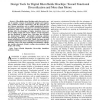Free Online Productivity Tools
i2Speak
i2Symbol
i2OCR
iTex2Img
iWeb2Print
iWeb2Shot
i2Type
iPdf2Split
iPdf2Merge
i2Bopomofo
i2Arabic
i2Style
i2Image
i2PDF
iLatex2Rtf
Sci2ools
TCAD
2010
2010
Design Tools for Digital Microfluidic Biochips: Toward Functional Diversification and More Than Moore
Abstract--Microfluidics-based biochips enable the precise control of nanoliter volumes of biochemical samples and reagents. They combine electronics with biology, and they integrate various bioassay operations, such as sample preparation, analysis, separation, and detection. Compared to conventional laboratory procedures, which are cumbersome and expensive, miniaturized biochips offer the advantages of higher sensitivity, lower cost due to smaller sample and reagent volumes, system integration, and less likelihood of human error. This paper first describes the droplet-based "digital" microfluidic technology platform and emerging applications. The physical principles underlying droplet actuation are next described. Finally, the paper presents computer-aided design tools for simulation, synthesis and chip optimization. These tools target modeling and simulation, scheduling, module placement, droplet routing, pin-constrained chip design, and testing.
Conventional Laboratory Procedures | Microfluidic Technology Platform | Software Engineering | TCAD 2010 | Various Bioassay Operations |
| Added | 21 May 2011 |
| Updated | 21 May 2011 |
| Type | Journal |
| Year | 2010 |
| Where | TCAD |
| Authors | Krishnendu Chakrabarty, Richard B. Fair, Jun Zeng |
Comments (0)

